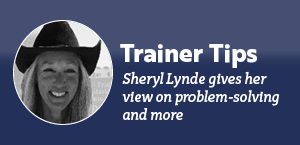If at first you don’t succeed…you’re normal.
—Rick Warren

If your training is producing unwanted results, or if you gave a less-than-stellar performance at the last show, congratulations—you’ve just learned what doesn’t work.
I believe failure occurs when people blame. By blaming, the only pay-off will be attracting other people to your circle who also blame.
As Warren says in the first sentence of his book, The Purpose Driven Life, “It’s not about me.”
What a concept! Its application enhances both my personal and professional life. I repeat these words every time I step into the round pen or put my foot in the stirrup. How can I best serve this horse, not for my benefit, but for his? I want to give him the best opportunity for a good life and a secure home with an owner who cannot get along without him.
I recently had a visit from people who were describing a scenario of a colt they are starting. The colt has been worked on the ground for the past year. When they felt it was time to ride, they were bucked off. A second attempt at mounting on a different day culminated in the same result; the rider hit the ground.
Here is what I would recommend. If the rider has hit the ground and brought me the colt, the first thing I would reevaluate is to find the hole in the training. What did the horse reveal that was unseen? Why did he buck? Its not about me. Its not even about the horse winning and me losing. Is he fearful and unprepared for this next step? Perhaps he is disrespectful and not accepting the rider’s place in the pecking order. Is he aggressive or a bully? The purpose of ground work, if it has been properly executed, is to identify the personality of the horse and replace the unwanted behaviors with safe and willing attitudes, as well as to enhance and strengthen the desirable behaviors. If a handler only has a couple of exercises that are continually repeated over a long period of time, even though the colt may execute them well, the exercises lose their effectiveness and the colt becomes bored and dull. Even though they complete the exercise, they offer no energy or enthusiasm. The handler needs to know when it is time to incorporate more and move on. Ground work is not something to hide behind or continue with endless repetitions of the same exercise. Groundwork is specifically created and designed for each horse with the sole goal in mind to carry the rider safely and confidently. You want to work the mind, not the lungs. If you can ride a buck, that’s great—you are a good rider. But if you never teach the colt to buck, then I believe you are a good horseman. You are working to serve the horse.
When a rider has been unseated, the horse has learned a new survival technique. If the colt’s nature is fearful, his fight-or-flight instinct kicks in, and survival is dependent on eliminating the perceived threat with a bolt to safety. If the horse is disrespectful, it is identifying with a herd instinct and upholding the natural balance of the herd. There is only one position, you are either above them or below them in the pecking order. If you are below, they will treat you how they would any insubordinate horse overstepping their authority. They take the space you are standing on with varying levels of force. If they are aggressive, they are resorting to their fight instinct to survive this new challenge for position. A rider’s new level of anxiety also adds to the perfect storm brewing.
The fearful horse needs to be sensitized to objects as well as desensitized. Their emotions need to be elevated, then lowered so they can learn to handle them at each level. Multi-sensory exercises in short increments are key to keep their interest and energy up and direct their attention on you. The disrespectful colt needs to be taught clear and consistent boundaries with exercises that incorporate outside turns in the round pen as well as backing up with energy. He needs to move his feet when asked with some zip in his step . The aggressive horse needs to be handled carefully. A cowardly bully tries to intimidate by rearing or charging with teeth bared. Yes, rearing can be intimidating but as soon as those feet touch the ground direct him away from you with outside turns and exercises that incorporate yielding the hindquarters, and backing up with energy. When his bluff is called, he gives in.
The “it’s not about me” adage changes my focus from what I want to happen to how I can better serve this horse.
–Sheryl
Leave a Comment
All fields must be filled in to leave a message.